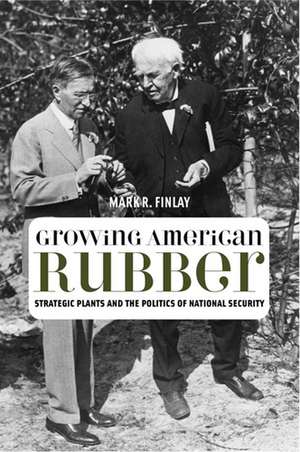Growing American Rubber: Strategic Plants and the Politics of National Security: Studies in Modern Science, Technology, and the Environment
Autor Mark R Finlayen Limba Engleză Paperback – 13 mar 2013
Growing American Rubber explores America's quest during tense decades of the twentieth century to identify a viable source of domestic rubber. Straddling international revolutions and world wars, this unique and well-researched history chronicles efforts of leaders in business, science, and government to sever American dependence on foreign suppliers. Mark Finlay plots out intersecting networks of actors including Thomas Edison, Henry Ford, prominent botanists, interned Japanese Americans, Haitian peasants, and ordinary citizensùall of whom contributed to this search for economic self-sufficiency. Challenging once-familiar boundaries between agriculture and industry and field and laboratory, Finlay also identifies an era in which perceived boundaries between natural and synthetic came under review.
Although synthetic rubber emerged from World War II as one solution, the issue of ever-diminishing natural resources and the question of how to meet twenty-first-century consumer, military, and business demands lingers today.
Preț: 251.94 lei
Preț vechi: 301.41 lei
-16% Nou
Puncte Express: 378
Preț estimativ în valută:
48.21€ • 51.55$ • 40.20£
48.21€ • 51.55$ • 40.20£
Carte indisponibilă temporar
Doresc să fiu notificat când acest titlu va fi disponibil:
Se trimite...
Preluare comenzi: 021 569.72.76
Specificații
ISBN-13: 9780813561578
ISBN-10: 0813561574
Pagini: 360
Ilustrații: 24
Dimensiuni: 152 x 229 x 18 mm
Greutate: 0.45 kg
Ediția:None
Editura: Rutgers University Press
Colecția Rutgers University Press
Seria Studies in Modern Science, Technology, and the Environment
ISBN-10: 0813561574
Pagini: 360
Ilustrații: 24
Dimensiuni: 152 x 229 x 18 mm
Greutate: 0.45 kg
Ediția:None
Editura: Rutgers University Press
Colecția Rutgers University Press
Seria Studies in Modern Science, Technology, and the Environment
Notă biografică
MARK R. FINLAY is a professor of history at Armstrong Atlantic State University. He is the author of numerous articles on the history of "chemurgy," the intersection of agriculture and industry.
Cuprins
List of Illustrations
List of Tables
Acknowledgments
Introduction
The American Dependence on Imported Rubber
Domestic Rubber Crops in an Era of Nationalism and Internationalism
Thomas Edison and the Challenges of the New Rubber Crops
The Nadir of Rubber Crop Research, 1928-1941
Crops in War: Rubber Plant Research on the Grand Scale
Sustainable Rubber from Grain
Resistance to Domestic Rubber Crops and the
Decline of the Emergency Rubber Project
From Domestic Rubber Crops to Biotechnology
Notes
Index
List of Tables
Acknowledgments
Introduction
The American Dependence on Imported Rubber
Domestic Rubber Crops in an Era of Nationalism and Internationalism
Thomas Edison and the Challenges of the New Rubber Crops
The Nadir of Rubber Crop Research, 1928-1941
Crops in War: Rubber Plant Research on the Grand Scale
Sustainable Rubber from Grain
Resistance to Domestic Rubber Crops and the
Decline of the Emergency Rubber Project
From Domestic Rubber Crops to Biotechnology
Notes
Index
Recenzii
"Finlay's narrative is at its best when he details this interface of economy, ecology, and politics, supported by extensive archival research into seemingly every prospect for growing rubber."
"Growing American Rubber is a significant contribution to many fields, not the least of which is the history of technology and science. Finlay deftly weaves stories of diplomacy, scientific research, interest-group politics, entrepreneurs, farmers, laborers, and the environment to tell the story of rubber-crop research in the first half of the twentieth century."
"A fascinating, well-written, and timely study."
"Finlay has written an engaging, poignant work that demonstrates the strategic connection between agriculture, industry, and national defense and shows the importance of rubber to American industrial and military might. Finlay consulted a variety of archival sources to produce this thoroughly researched, well-documented work. He tells an important story that has broader implications for diplomatic historians and scholars who study the importance of agriculture and industry. Recommended."
"Finlay's excellent book indicates just how central rubber has been to American history since the start of the twentiety century."
"By moving beyond the well-known stories of Edison's and Ford's efforts to find domestic sources of rubber, Mark Finlay provides readers with a fresh and important analysis of the connections between military and economic national security and access to a vital strategic natural resource that has implications for the present day."
"At last, the humble rubber plant takes center stage, vividly demonstrating the interdependence of agriculture and industry in twentieth-century America. A remarkable and timely book!"
"Mark Finlay's research has been extensive and is unlikely to be duplicated any time in the near future. He writes with fluency and great narrative verve and he successfully weaves together the biological, technological, economic, political, and military strands of a complex story."
"This is a good story, well-told. The range and variety of resources that Finlay has explored is first-rate. As we now debate the sustainability of natural resources, the themes of this book could not be more relevant."
"Finlay's well-researched work makes clear the importance of rubber in American history. The United States shifted from domestic organic to inorganic and foreign solutions to the modern consumer driven economy. Unfortunately the United States still relies on a risky combination of imported natural rubber and synthetic rubber derived from petroleum, making this study timely and relevant."
"Mr. Finlay has produced an outstandingly well-documented and thoroughly researched narrative of the history of the modest rubber plant."
Descriere
Growing American Rubber explores America's quest during tense decades of the twentieth century to identify a viable source of domestic rubber. Straddling international revolutions and world wars, this unique and well-researched history chronicles efforts of leaders in business, science, and government to sever American dependence on foreign suppliers. Although synthetic rubber emerged from World War II as one solution, the issue of ever-diminishing natural resources and the question of how to meet modern-day demands linger today.








